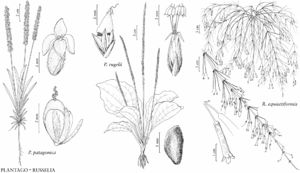Russelia
Enum. Syst. Pl., 6, 25. 1760.
| Taxon | Illustrator ⠉ | |
|---|---|---|
 | Plantago patagonica Plantago rugelii Russelia equisetiformis | Barbara Alongi Barbara Alongi Barbara Alongi |
Shrubs [herbs, perennial]. Stems arching [erect or ascending], glabrous [hairy]. Leaves caducous, cauline, whorled or opposite; petiole absent or present; blade not fleshy, not leathery, margins dentate or entire, distal leaf-blade needlelike or scalelike. Inflorescences axillary, cymes; bracts present. Pedicels present; bracteoles usually present. Flowers bisexual; sepals 5, basally connate, calyx bilaterally symmetric, tubular or campanulate, lobes broadly ovate [lanceolate]; corolla red, bilaterally symmetric, bilabiate, tubular [funnelform], tube base not spurred or gibbous, lobes 5, abaxial 3, adaxial 2; stamens 4, basally adnate to corolla, didynamous, filaments glabrous; staminode [0 or] 1, conical [filiform]; ovary 2-locular, placentation axile; stigma subcapitate. Fruits capsules, dehiscence septicidal, densely packed with white, membranous hairs. Seeds 50–200, dark-brown [black], ovoid, wings absent. × = 10.
Distribution
Introduced; Fla., Mexico, Central America, n South America
Discussion
Species 52 (1 in the flora).
Russelia is unique in having capsules filled with densely packed hairs. Morphological and molecular characters suggest Russelia is related to Tetranema Bentham; both seem to be basal to the clade containing Chelone and Penstemon (D. C. Albach et al. 2005).